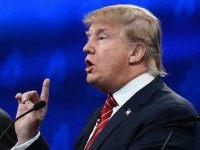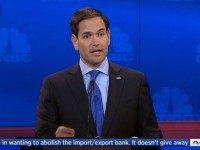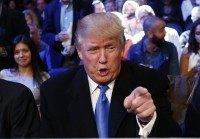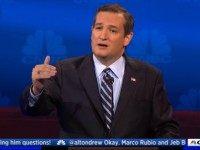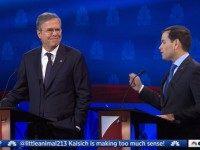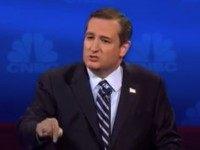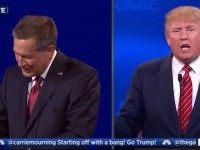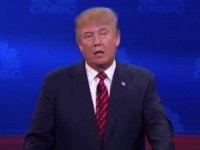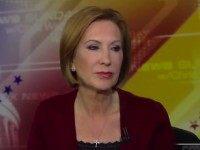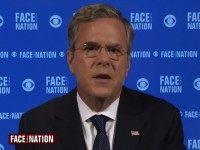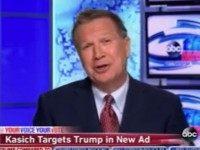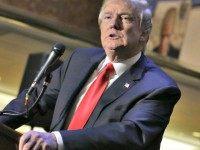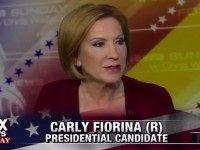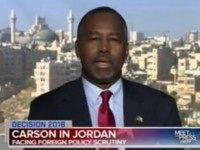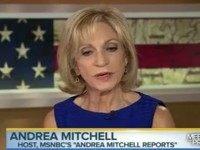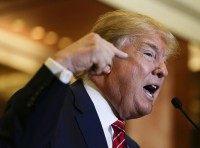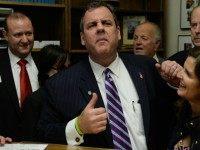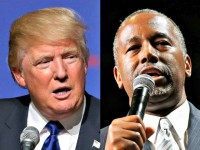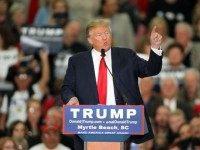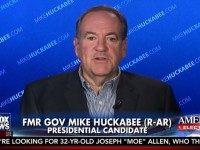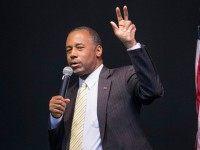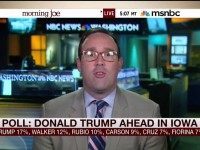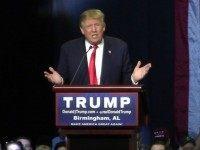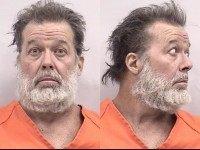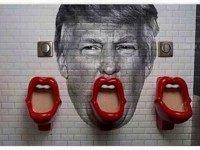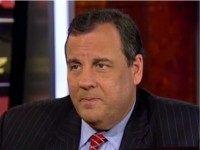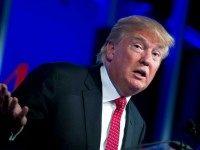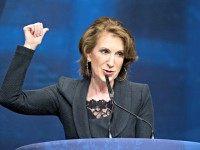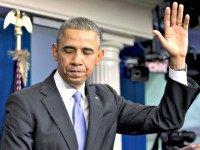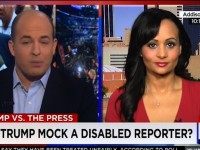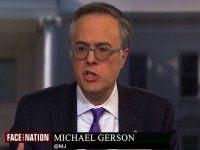
John Kasich, Jeb Bush, Marco Rubio, Donald Trump, Ben Carson, Ted Cruz, Carly Fiorina and Rand Paul take the stage during a Republican presidential debate at the Milwaukee Theatre on Nov. 10 in Milwaukee. (Morry Gash/Associated Press)
For all the candidates, all the debates and all the unpredictability, the race for the Republican presidential nomination in 2016 has taken a clear shape over the past month or so.
There is a four-candidate top tier that has separated itself from the rest of the pack. There is then a trio of “if/then” candidates who would need a major mistake or collapse from one of the top four to have a realistic chance at winning. Everyone else running has a puncher’s chance — at best — at being relevant in the nomination fight.
Below are my rankings of the candidates who can still make a plausible case for being the nominee. (By plausible, I mean that someone who is not directly related to them could listen to the case and not laugh out loud.) The top-ranked candidate is the one most likely to be the GOP nominee.
7. Chris Christie. The New Jersey governor has (finally) moved beyond Bridgegate, allowing his natural skills as a candidate to shine through. He has focused heavily on New Hampshire throughout the campaign, a smart move given that Iowa’s caucuses have been less than predictive in the past two Republican presidential nomination fights. Christie still needs a stumble or two by the establishment types in front of him, but he has fought his way back to respectability.
6. John Kasich. The Ohio governor is in a similar place to Christie, putting a huge emphasis on New Hampshire in hopes of a breakthrough in a state known for rewarding more moderate types. Kasich’s numbers in New Hampshire are slightly better than Christie’s, which is why he is ranked slightly higher, but some of that is simply the residual effect of a major TV push his super PAC made in the state a few months back.
5. Jeb Bush. The former Florida governor took just 6 percent of the national vote in a Washington Post-ABC News poll released Sunday, his worst showing in the survey in two years. What he has going for him is what he has always had: money. His super PAC remains well stocked, although the fact that $20 million has been spent on his behalf on TV ads in Iowa, New Hampshire and South Carolina without moving his numbers in any sort of positive way should be a big concern for his campaign.
4. Ben Carson. For the briefest of moments, the retired neurosurgeon was the front-runner for the GOP nod. But Carson has slipped from that perch largely because of self-inflicted errors, including a national security adviser to his campaign acknowledging to the New York Times that the doctor simply doesn’t get it when it comes to foreign policy. That plus Carson’s struggles in debates to demonstrate know-how on world affairs have raised questions about his readiness for the top office. His strong — and largely unwavering — support among social conservatives still make Carson dangerous, however, particularly in Iowa.
3. Ted Cruz. The senator from Texas continues to run the best campaign of anyone in the field. He has carefully avoided alienating supporters of Carson and Donald Trump in hopes that if and when the two political newcomers flame out, he will be the natural receptacle for their supporters. Cruz also has a conglomerate of well-funded super PACs that will be able to make the case for him (and against his opponents) between now and March. His biggest problem is that no matter how many mistakes and misstatements Carson and Trump make, their supporters stand by them. Cruz needs one (or both) of that duo to begin to collapse to move up.
2. Donald Trump. In the new Post-ABC poll, the real estate mogul wins about 1 in 3 GOP primary voters and has a double-digit edge on his next closest rival, Carson. In Iowa, Trump is in first, according to the Real Clear Politics polling average, although Carson keeps it competitive. Trump remains ahead by a wide margin in New Hampshire. No one else in the field is in that strong a position in the first two voting states. And, as a billionaire, Trump can simply cut himself a check for any amount at any time in the next few months. Running counter to all that is Trump’s seeming intention to push the boundaries on every issue, including immigration and national security. That tendency should eventually catch up with him, although he has resisted the political rules of gravity for months.
1. Marco Rubio. The senator from Florida is the most complete candidate in the field today. He is a skilled debater. His personal story is compelling and well told. He has positioned himself solidly in third place nationally without spending heavily from his own coffers or running the risk of peaking too early. He survived what many people believed to be a campaign killer when the stories about his credit card use in his younger days wound up being largely a nothingburger. Rubio’s biggest problems are basic ones: money and organization. His haul in the third fundraising quarter — $6 million — was far less than someone in his position could be expected to bring in. And his early-state voter-ID and turnout operations are less far along than those of Trump and Bush. Still, if you were betting today, you would bet on Rubio.
Don't you just love it when the dems ...help us out by picking our nominees.....Bless their little pointed heads....and black hearts...;)
http://google.com/newsstand/s/CBIw99XwpSY
